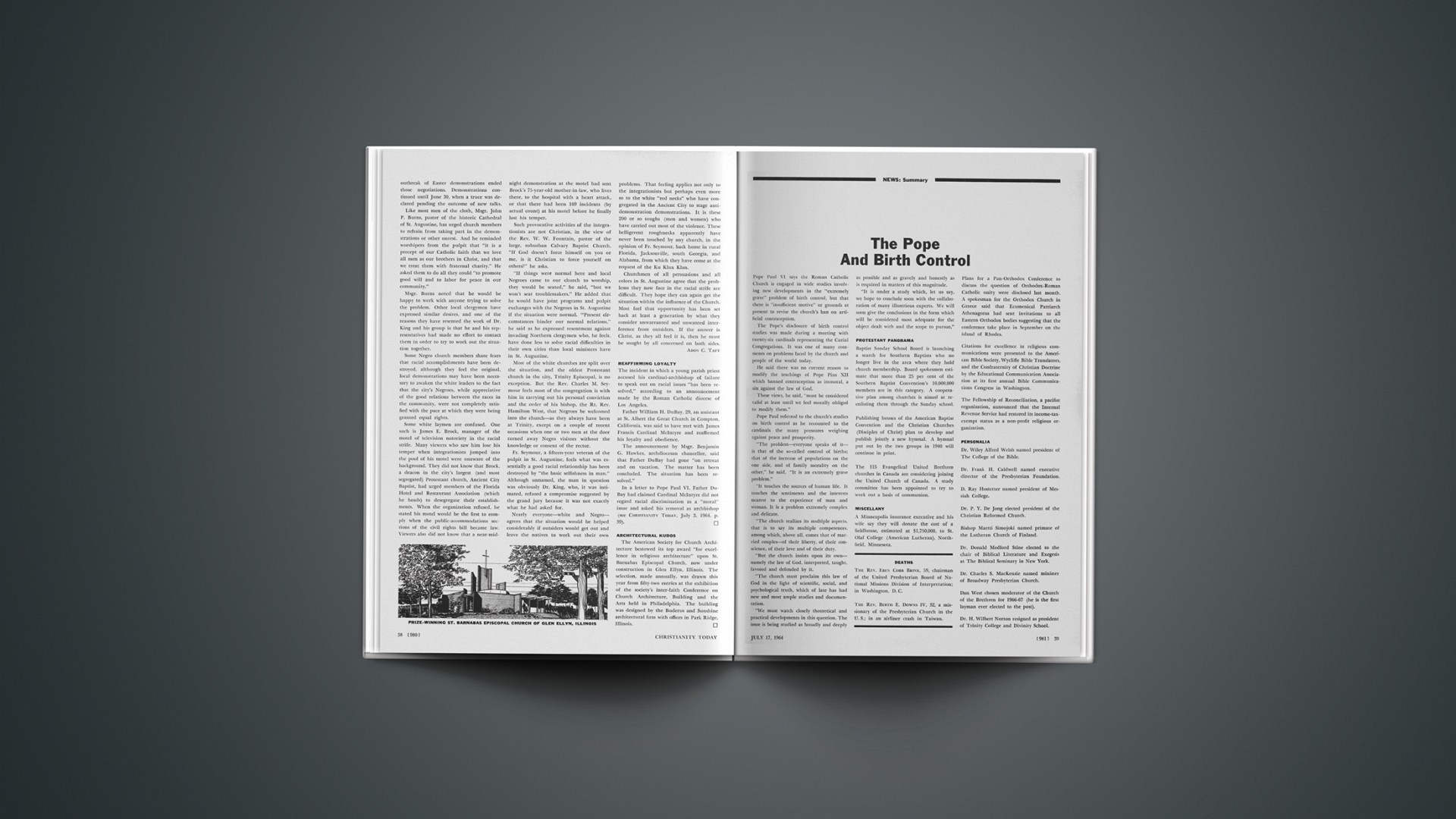Pope Paul VI says the Roman Catholic Church is engaged in wide studies involving new developments in the “extremely grave” problem of birth control, but that there is “insufficient motive” or grounds at present to revise the church’s ban on artificial contraception.
The Pope’s disclosure of birth control studies was made during a meeting with twenty-six cardinals representing the Curial Congregations. It was one of many comments on problems faced by the church and people of the world today.
He said there was no current reason to modify the teachings of Pope Pius XII which banned contraception as immoral, a sin against the law of God.
These views, he said, “must be considered valid at least until we feel morally obliged to modify them.”
Pope Paul referred to the church’s studies on birth control as he recounted to the cardinals the many pressures weighing against peace and prosperity.
“The problem—everyone speaks of it—is that of the so-called control of births; that of the increase of populations on the one side, and of family morality on the other,” he said. “It is an extremely grave problem.”
“It touches the sources of human life. It touches the sentiments and the interests nearest to the experience of man and woman. It is a problem extremely complex and delicate.
“The church realizes its multiple aspects, that is to say its multiple competences, among which, above all, comes that of married couples—of their liberty, of their conscience, of their love and of their duty.
“But the church insists upon its own—namely the law of God, interpreted, taught, favored and defended by it.
“The church must proclaim this law of God in the light of scientific, social, and psychological truth, which of late has had new and most ample studies and documentation.
“We must watch closely theoretical and practical developments in this question. The issue is being studied as broadly and deeply as possible and as gravely and honestly as is required in matters of this magnitude.
“It is under a study which, let us say, we hope to conclude soon with the collaboration of many illustrious experts. We will soon give the conclusions in the form which will be considered most adequate for the object dealt with and the scope to pursue.”
Protestant Panorama
Baptist Sunday School Board is launching a search for Southern Baptists who no longer live in the area where they hold church membership. Board spokesmen estimate that more than 25 per cent of the Southern Baptist Convention’s 10,000,000 members are in this category. A cooperative plan among churches is aimed at reenlisting them through the Sunday school.
Publishing houses of the American Baptist Convention and the Christian Churches (Disciples of Christ) plan to develop and publish jointly a new hymnal. A hymnal put out by the two groups in 1940 will continue in print.
The 115 Evangelical United Brethren churches in Canada are considering joining the United Church of Canada. A study committee has been appointed to try to work out a basis of communion.
Miscellany
A Minneapolis insurance executive and his wife say they will donate the cost of a fieldhouse, estimated at $1,750,000, to St. Olaf College (American Lutheran), Northfield, Minnesota.
Deaths
THE REV. EBEN COBB BRINK, 59, chairman of the United Presbyterian Board of National Missions Division of Interpretation; in Washington, D. C.
THE REV. BERTIS E. DOWNS IV, 32, a missionary of the Presbyterian Church in the U. S.; in an airliner crash in Taiwan.
Plans for a Pan-Orthodox Conference to discuss the question of Orthodox-Roman Catholic unity were disclosed last month. A spokesman for the Orthodox Church in Greece said that Ecumenical Patriarch Athenagoras had sent invitations to all Eastern Orthodox bodies suggesting that the conference take place in September on the island of Rhodes.
Citations for excellence in religious communications were presented to the American Bible Society, Wycliffe Bible Translators, and the Confraternity of Christian Doctrine by the Educational Communication Association at its first annual Bible Communications Congress in Washington.
The Fellowship of Reconciliation, a pacifist organization, announced that the Internal Revenue Service had restored its income-tax-exempt status as a non-profit religious organization.
Personalia
Dr. Wiley Alfred Welsh named president of The College of the Bible.
Dr. Frank H. Caldwell named executive director of the Presbyterian Foundation.
D. Ray Hostetter named president of Messiah College.
Dr. P. Y. De Jong elected president of the Christian Reformed Church.
Bishop Martti Simojoki named primate of the Lutheran Church of Finland.
Dr. Donald Medford Stine elected to the chair of Biblical Literature and Exegesis at The Biblical Seminary in New York.
Dr. Charles S. MacKenzie named minister of Broadway Presbyterian Church.
Dan West chosen moderator of the Church of the Brethren for 1966–67 (he is the first layman ever elected to the post).
Dr. H. Wilbert Norton resigned as president of Trinity College and Divinity School.










